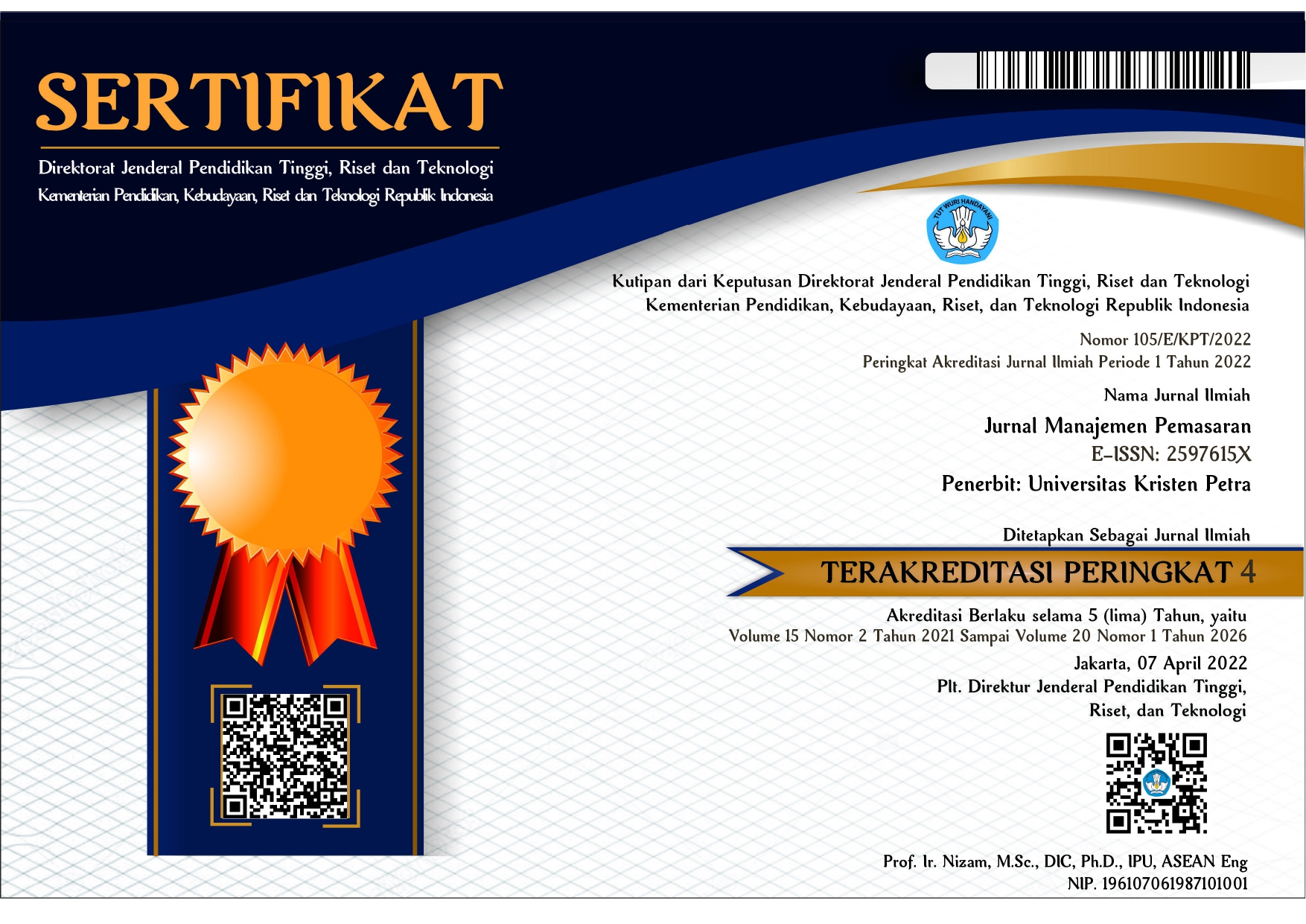ANALISA FAKTOR YANG PENTING DARI DIMENSI ELECTRONIC WORD OF MOUTH (EWOM) BAGI KONSUMEN DALAM MEMILIH HOTEL DI SITUS ONLINE TRAVEL AGENT (OTA)
 :
:
https://doi.org/10.9744/pemasaran.9.2.78-86
Keywords:
Electronic word of mouth, online travel agent, hotel choice.Abstract
Online Travel Agent (OTA) is an e-commerce which facilitates its customers to buy various tourism products (e.g. hotel rooms). During hotel selection process on OTA, customers tend to look for information such as Electronic Word of Mouth (eWOM) or review. eWOM has 13 dimensions that were analyzed based on its importance. This research is conducted to find out which factors are important for customers when selecting a hotel on OTA. The research type is quantitative descriptive using exploratory factor analysis. The analysis showed that there are 3 important factors: content of review, source credibility, writing style and recommendation rating. Content of review is the most important factors among those 3 factors according to its contribution in hotel selection.References
Ayeh, J. K., Au, N., & Law, R. (2013). “Do we believe in TripAdvisor?” Examining credibility perceptions and online travelers’ attitude toward using user-generated content.Journal of Travel Research, 52(4), 437-452.
Brynjolfsson, E., & Smith, M. D. (2000). Frictionless commerce? A comparison of internet and conventional retailers. Management science, 46(4), 563-585.
Cheung, C. M., Lee, M. K., & Rabjohn, N. (2008). The impact of electronic word of mouth. Internet Research, 18(3), 229-247.
Cheung, M., Luo, C., Sia, C. & Chen, H. (2009). Credibility of electronic word of mouth: Informational and normative determinants of online consumer recommendations. International Journal of Electronic Commerce, 13(4), 9-38.
Cheung, C. M., & Thadani, D. R. (2010). The effectiveness of electronic word of mouth communication: A literature analysis. Proceedings of the 23rd Bled eConference eTrust: Implications for the Individual, Enterprises and Society, 329-345.
Chevalier, J. A., & Mayzlin, D. (2006). The effect of word of mouth on sales: Online book review. Journal of Marketing Research, 43(3), 345-354.
Davis, A., & Khazanchi, D. (2008). An empirical study of online word of mouth as predictor for multiproduct category ecommerce sales. Electronic markets, 18(2), 130-141.
Dellarocas, C., Zhang, X. M., & Awad, N. F. (2007). Exploring the value of online product reviews in forecasting sales: The case of motion pictures. Journal of Interactivemarketing, 21(4),23-45.
Gretzel, U., & Yoo, K. H. (2008). Use and impact of online travel reviews. Information and Communication Technologies in Tourism 2008, 8(2), 35-46.
Grewal, D., Munger, J. L., Iyer, G. R., & Levy, M. (2003). The influence of internet‐retailing factors on price expectations. Psychology & Marketing, 20(6), 477-493.
Hennig-Thurau, T., Gwinner, K. P., Walsh, G., Gremler, D. D. (2004). Electronic word of mouth via consumer opinion platforms: What motivates consumers to articulate themselves on the internet?. Journal of Interactive Marketing, 18(1), 38-52.
Hennig-Thurau, T., Walsh, G., & Walsh, G. (2003). Electronic word of mouth: Motives for and consequences of reading customer articulations on the Internet. International Journal of Electronic Commerce, 8(2), 51-74.
Jansen, B. J., Zhang, M., Sobel, K., &Chowdury, A. (2009). Twitter power: Tweets as electronic word of mouth. Journal of the American Society for Information Science and Technology, 60(11), 2169-2188.
Kiecker, P., & Cowles, D.L. (2001). Interpersonal communication and personal influence on the Internet: A framework for examining online word of mouth. Journal of Euromarketing, 11(2), 71–88.
Luo, C., Luo, X. R., Xu, Y., Warkentin, M., & Sia, C. L. (2015). Examining the moderating role of sense of membership in online review evaluations.Information & Management, 52(3), 305-316.
McCarthy, L., Stock, D., & Verma, R. (2010). How travelers use online and social media channels to make hotel-choice decisions. Cornell Hospitality Report, 10(18), 1-24.
Park, D. H., & Kim, S. (2008). The effectsof consumer knowledge on message processing of electronic word of mouth via online consumer reviews. Electronic Commerce Research and Applications, 7(4), 399-410.
Peterson, R.A., & Merino, M.C. (2003). Consumer information search behavior and the Internet. Psychology & Marketing, 20(2), 99-121.
Senecal, S., & Nantel, J. (2004). The influence of online product recommendations on consumers’ online choices.Journal of retailing, 80(2), 159-169.
Purnawirawan, N., De Pelsmacker, P., Dens, N. & Eisend, M. (2015). A metaanalytic investigation of the role of valence in online reviews.Journal of Interactive Marketing, 31, 17-27.
Rizkia, C. (2015, September 30). Tahun depan, pembeli online di Indonesia capai 8,7 juta orang. Selular.ID. Retrieved February 12, 2016, from http://selular.id/news/e-ommerce/2015/09/tahun- depan-pembeli-online-di-indonesia-capai-87-juta-orang/
Short, T. (2014, June 11). Survey: how travelers use online hotel reviews. Software Advice.Retrieved September 18, 2015, from http://overnight-success.softwareadvice.com/survey-how-travelers-use-online-hotel-reviews-0614/.
Sidali, K. L., Schulze, H., & Spiller, A. (2009).The impact of online reviews on the choice of holiday ccommodations. Information and Commu-nication Technologies in Tourism 2009, 87-98.
Teng, S., Wei Khong, K., Wei Goh, W., & Yee Loong Chong, A. (2014). Examining the antecedents of persuasive eWOM messages in social media. Online Information Review, 38(6), 746-768.
Vermeulen, I. E., & Seegers, D. (2009). Tried and tested: The impact of online hotel reviews on consumer consideration. Tourism Management, 30(1), 123-127.
Watts, S. A., & Zhang, W. (2008). Capitalizingon content: Information adoption in two online communities. Journal of the Association for Information Systems, 9(2), 73-94.
Zhang, K. Z., Zhao, S. J., Cheung, C. M., & Lee, M. K. (2014). Examining the influence of online reviews on consumers' decisionmaking: A heuristic–systematic model. Decision Support Systems, 67, 78-89.















